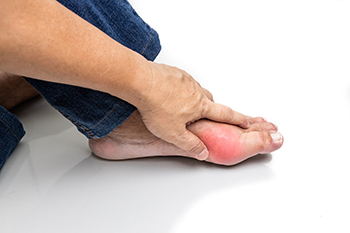
Gout is a painful type of arthritis that often begins in the big toe but can also affect other joints in the foot or ankle. It results from a buildup of uric acid crystals in the joints, which may lead to intense pain, swelling, and redness. A podiatrist can help manage gout in the feet by first confirming the diagnosis through a physical exam, and, when needed, testing fluid from the affected joint. During gout flare-ups, a podiatrist can provide targeted treatment to relieve inflammation and reduce discomfort in the affected foot or ankle. If gout becomes chronic, this type of doctor can monitor long-term joint changes and may recommend custom footwear or orthotics to reduce pressure on sensitive joints. In rare cases, surgery may be considered to remove hardened uric acid deposits, called tophi, or to repair joint damage caused by repeated attacks. If you have recurrent foot pain attributed to gout, it is suggested that you schedule an appointment with a podiatrist for help in managing this condition.
Gout is a painful condition that can be treated. If you are seeking treatment, contact Arnold Farbstein, DPM from Texas. Our doctor will treat your foot and ankle needs.
What Is Gout?
Gout is a form of arthritis that is characterized by sudden, severe attacks of pain, redness, and tenderness in the joints. The condition usually affects the joint at the base of the big toe. A gout attack can occur at any random time, such as the middle of the night while you are asleep.
Symptoms
- Intense Joint Pain - Usually around the large joint of your big toe, and it most severe within the first four to twelve hours
- Lingering Discomfort - Joint discomfort may last from a few days to a few weeks
- Inflammation and Redness -Affected joints may become swollen, tender, warm and red
- Limited Range of Motion - May experience a decrease in joint mobility
Risk Factors
- Genetics - If family members have gout, you’re more likely to have it
- Medications - Diuretic medications can raise uric acid levels
- Gender/Age - Gout is more common in men until the age of 60. It is believed that estrogen protects women until that point
- Diet - Eating red meat and shellfish increases your risk
- Alcohol - Having more than two alcoholic drinks per day increases your risk
- Obesity - Obese people are at a higher risk for gout
Prior to visiting your podiatrist to receive treatment for gout, there are a few things you should do beforehand. If you have gout you should write down your symptoms--including when they started and how often you experience them, important medical information you may have, and any questions you may have. Writing down these three things will help your podiatrist in assessing your specific situation so that he or she may provide the best route of treatment for you.
If you have any questions, please feel free to contact our office located in Houston, TX . We offer the newest diagnostic and treatment technologies for all your foot care needs.
